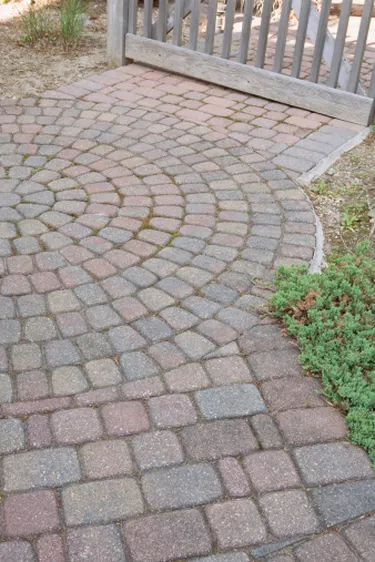
Pavers come in a variety of sizes, shapes and designs to allow for landscaping creativity. Pavers work well for patios, driveways, garden pathways or pool surrounds. Several factors play a role in the total cost, including the type of pavers you choose, the size of the patio and whether you do the work or hire someone.
Material
Video of the Day
The base material of the pavers determines the cost. Poured or stamped concrete pavers come in at the low end at around $4 to $12 per square foot, including installation. Stone pavers can offer an affordable option with a low of $9 per square foot, but they can go up to $28 per square foot with the installation. Clay pavers typically cost around $17 to $20 a square foot, while natural stone falls at the high end at around $30 to $35 per square foot, including installation.
Video of the Day
Style
Each material type offers various styles that affect the price. Pavers with designs or specialty colors typically cost more than a simple, plain stone. When comparing the costs for various styles of pavers, consider the size of the individual stones. Stores often price the pavers per stone, but the size of the individual stones may vary. You'll need more 6-by-6-inch pavers to cover an area than you would for 12-by-12-inch pavers. The larger pavers may cost slightly more, but the larger coverage area may make them more inexpensive for the total project. Compare the pricing on a per-square-foot basis for a more accurate cost estimate.
Paver Area
The size of the area you're covering also affects cost. A larger area requires more pavers and also takes more time, increasing labor costs if the patio is professionally installed. To estimate the total paver cost, determine the cost per square foot and the total area you're covering. For example, if your patio will cover 200 square feet and the pavers you choose cost $10 per square foot, expect to pay about $2,000.
Layout
The layout of the paver area is another contributing factor in the cost. A basic shape using all the same pavers takes less time and fewer materials, making it the most affordable layout option. A patio or other area with curved edges or different shaped areas requires more cut-to-fit pavers. The layout also takes longer to put down, increasing the labor costs. Mixing in different types or sizes of pavers also increases the amount of time because the bricks take longer to fit correctly.